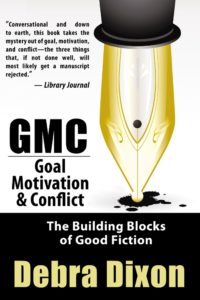
I love discovering new authors, so I wanted my blog to be a place where readers and my author pals could come together. Only we like to do this Speed-Dating style. Check out a new author and her work here every Wednesday, and if the spark is there, you’ll have a match.
This week’s guest: Debra Dixon


15 Questions
1. If you had to wake to one song on your clock radio or cell phone dock every morning for the rest of your life, what song would you choose and why?
Any one of several Christmas songs. I love them. And I love singing along with them. Nerd alert!
2. Since one of our September guests is also the author of a nonfiction book on writing (Debra Dixon), name some of your favorite books to help writers.
- THE WRITER’S JOURNEY – Christopher Vogler
- SELF-EDITING FOR FICTION WRITERS – Renni Browne and Dave King
- THE ELEMENTS OF STYLE – William Strunk, Jr. & E.B. White
- And . . . um. . . that GMC book.
3. Favorite TV hottie: Neal Caffrey (Matt Bomer) from White Collar, Jackson Avery (Jesse Williams) from Grey’s Anatomy, Angel (David Boreanaz) from Angel or Derek Morgan (Shemar Moore) from Criminal Minds?
Seriously? Jon Snow from Game of Thrones (Kit Harington). But I wouldn’t kick any of the above out of bed for eating crackers!
4. In which genres and sub-genres have you been published, and what does your narrow or sweeping focus say about you?
Romance and fantasy. Romance covers a number of sub-genres: Contemporary, Paranormal, Suspense, Rom Com. Also Young Adult. I guess what that says about me, along with my fairly diversified list at BelleBooks/Bell Bridge, is that I like a good genre or commercial fiction story.
5. Is social media a bad habit for you, and, if so, what is your favorite time drain?
I am rarely plugged into social media, much to the chagrin of the marketing folks at BelleBooks. I have so little time, I have to choose between my family, my authors, my quilting, and speaking. Social Media is on the sidelines screaming, “Coach, hey Coach! Put me in. I’m ready! Coach!”
6. Name the most embarrassing concert you’ve ever attended?
The one where I had to leave before the very late/delayed headline band came on because I had a curfew. First date. It’s a wonder my husband still married me.
7. Which is your preference to write: love scenes or murder scenes?
Murder scenes. My parents could read those.
8. Name one thing you wish you could change about yourself.
The ability to pretend that things you put on the calendar for “later” still have to be done SOON. That always gets me in trouble.
9. Favorite autumn activity: roasting marshmallows by a fire, driving miles for fall-leaf tours or cuddling with a special someone for an indoor movie marathon?
I’d rather stream a TV season WHILE eating s’mores on my couch, but the husband loves a good road trip. And he drives, so I’d probably love a leaf tour, too.
10. Name a theme you often see popping up in your stories.
Personal empowerment. Finding life’s purpose and staking a flag to claim your life for yourself regardless of the possibility of failure.
11. If you had no audience, and no regrets would follow, what midnight snack(s) would you be gorging on tonight?
Homemade Fudge. Darn. Now I want some. . . ::sounds of me wandering into the hallway:: “Honey?”
12. What was the lowest point in your writing career, and how did you recover from it?
When I wrote my first romantic suspense—almost on a whim, I had so much to learn. For the first time in my career, I got major revisions from an editor. Her first words to me were, “I’m disappointed.” I had to pull the book apart, throw out 20,000 words of plot and resurrect the book. Then I had to do a second edit, which I’d never had to do before. But. . .the book was so much better. (award winning better) I had some serious trepidation about writing another book, but my husband said, “How much worse could it be?” True. I realized I’d been through the fire. I had the skills. So, I dug in and tackled the next idea.
13. With no money limit, if you could construct the most perfect writing space, what would it look like?
It would have a chocolate fountain, and come with a pool boy and a full-time maid.
14. If a director made a movie about your life, which actress (living or dead) would you like to portray you, and which one would more likely be cast?
Like: Sandra Bullock (Who doesn’t love her?)
Likely: Kathy Bates (Sort of like her in Misery getting writers to do what she wants them to do <g> . Actually I’m a loving and charming editor, most of the time.)
15. When you’re not writing (or working a day job), what are some of your favorite ways to spend your leisure hours?
I am a mad quilter. It’s ridiculous. I have a purpose built room and a full closet in another room to house this insane hobby. I just hosted a quilting retreat at my house, and my husband is so awesome at taking care of us and feeding us, that someone left money in the refrigerator and silverware drawer to be sure he’d invite the crew back.
***

GMC:
Goal, Motivation & Conflict
By Debra Dixon
More examples of motivation
You need to learn GMC by applying it to other people’s work. Examine movies and books of different genres. No matter the subject matter, the basic question of motivation is still going to be “Why?”
Why does Richard Kimball of The Fugitive want to find the man who killed his wife?
Because he wants to clear his name.
Because he wants justice for his wife.
Because he doesn’t want to spend the rest of his life in jail.
One of these motivations is urgent. All are compelling. Together these motivations are strong enough for us to believe each and every action Kimball takes in the movie. He is focused on one goal, pushed toward it by motivations that won’t let him quit. This is of course external motivation. It relates to the concrete external goal of Kimball, which is to find the man who killed his wife.
This particular movie is tightly constructed. The internal motivation also feeds the external GMC. As I mentioned previously, we are left to piece together Kimball’s internal GMC. Therefore, I’m listing a couple of motivations which suggest themselves in the movie. Neither is fully-developed, but they are strongly hinted.
Why does he want to free himself from the guilt?
Because he is haunted by visions of his failure. He has nightmares and waking-mares that remind him of every detail of the killing.
Because he’ll never be able to go forward until he puts the past behind him.
As in Dorothy’s example, the internal motivation is something that creates emotion. Writers of romance novels should give the internal elements of GMC particular attention since romance novels are well-known for having an external story and an interior story. “Wounded heroes” can usually be understood by studying their internal GMC. In fact internal GMC is the best weapon a romance writer has for making the popular alpha male hero—the strong silent type—accessible to the reader. If you want the reader to fall in love with Rhett Butler, then the reader had better understand what makes the man tick. If we know what’s important to him, we sympathize with him.
The Fugitive offers a good example of secondary character motivations. Deputy Marshal Gerard is like a dog with a bone.
Why does he want to capture Richard Kimball?
Because he believes felons are dangerous.
Because it is his duty to protect the citizens of the U.S.
Because his reputation is on the line.
Gerard’s multiple external character motivations for this one goal are important. Through the course of the investigation Gerard will learn that Kimball is not dangerous. The man hasn’t harmed a flea. Hasn’t committed any crimes that injure people. He’s even put himself at risk to save a young boy misdiagnosed in an emergency room. All his actions form the portrait of an innocent man trying to clear his name.
This felon isn’t dangerous. Therefore one of Gerard’s motivations is weakened. Fortunately, Gerard has two other motivations to draw on, two more that push him forward with the same determination as before. In fact, Kimball’s escape during the jail scene is a personal prick to Gerard’s ego. Gerard had Kimball in his sights, and Kimball still got away.
As one motivation weakens (Kimball is not dangerous) another motivation (Gerard’s reputation) is strengthened. When using multiple motivations, be cognizant of the ways they can work to keep your character on task.
***
GMC: GOAL, MOTIVATION & CONFLICT, a release from Gryphon Books for Writers and a widely acclaimed text for writers, may be purchased through these retailers: Amazon, Kobo, Barnes & Noble, Google and Apple.
***
About Debra
Debra Dixon is the President and Publisher of BelleBooks and its imprints—Bell Bridge Books and ImaJinn Books, which tackle a broad spectrum of genres. Their titles have been picked up in translation and by major publishers in sub-rights deals for mass market paperback, book club, audio and large print. The company has published original work from NYT and USA Today bestselling authors and is delighted to be publishing the new Diana Pharaoh Francis urban fantasy series which has consistently received Top Picks and 4.5 stars from RT Magazine.
Early in her career, Debra published with major publishers, wrote ten books, contributed to twelve anthologies, and served as Vice President of Romance Writers of America. Her popular GMC: Goal, Motivation, and Conflict workshop spawned a book that has become a how-to bible for writers.
